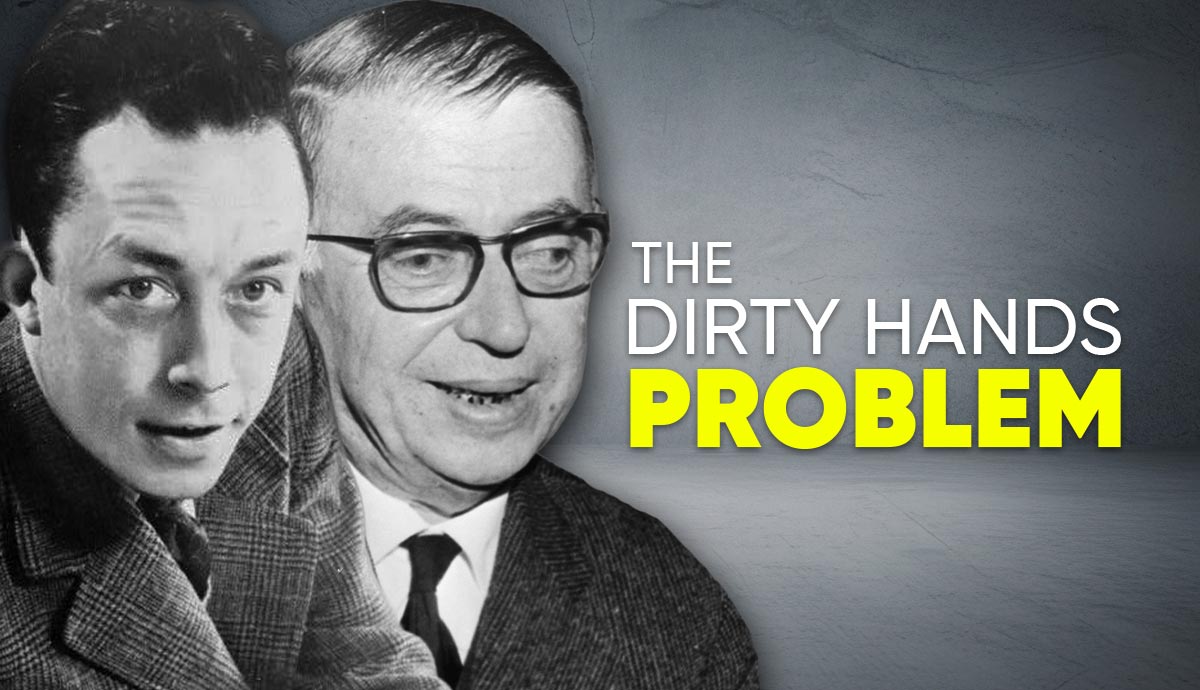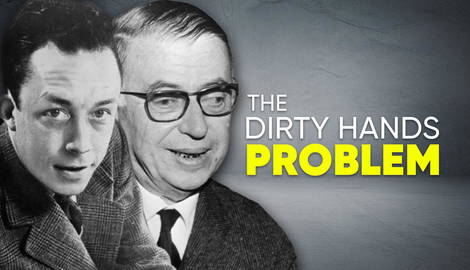
The problem of dirty hands in society is a deceptively simple idea. At its heart is the question: is it ever permissible to do something morally wrong in order to secure a later good? There are many formulations of the problem and disagreements over what counts as “getting one’s hands dirty.” Fortunately, we are not concerned here with offering a comprehensive account. Here, the focus is on what Sartre and Camus had to say on the subject, as interpreted from their plays: Dirty Hands (1948) and The Just Assassins (1949).
The Problem of Dirty Hands

Before examining the plays, it will be useful to provide examples of the problem to give some context for Camus’s and Sartre’s disagreement on the subject.
Imagine you are the leader of a country at war. The only way to end the war is by forcing the enemy into total surrender. There are two ways to achieve this: (1) a full land invasion by sea with boots on the ground or (2) by aerial bombing the opposition into submission. In other words, you are being asked to take the lives of innocent people in order to save the lives of many more. Would you be prepared to “get your hands dirty” and go with the second option?
Another example. Consider a political party split into two factions: those who believe the only route to power is through a coalition with other parties, even ones whose views are abhorrent; and those who want to remain true to their ideals and refuse to compromise. Both sides are convinced that their way is the only way to create a better society. However, only the group that is willing to compromise and form coalitions has any real chance of gaining enough power to improve society. Now, imagine you are a member of this party. Would you be willing to “get your hands dirty” and make deals, or would you remain true to your ideals?
Jean-Paul Sartre’s Dirty Hands (1948)

The last example of the problem of dirty hands in the previous section is central to the plot of Sartre’s play, titled aptly “Dirty Hands.”
The play revolves around the characters of Hugo, a young socialist idealist, and Hoederer, his Party leader. The Party has discovered that Hoederer is in secret negotiations with other political groups, with the intention of forming a coalition from which he hopes the Socialists will emerge as the dominant force. Many see their leader’s actions as treachery. Hugo volunteers to take a position as Hoederer’s secretary in an effort to assassinate him before any deals are finalized.
Here we have two kinds of “dirty hands.” The first is Hoederer getting his hands dirty by compromising his ideals in order to gain power. The second is Hugo getting his hands dirty by committing murder in order to protect the Party and their political vision.
Hugo moves in with Hoederer along with his young wife Jessica. There is tension between Hugo and his wife, as well as between his wife and Hoederer. Things are further complicated by the fact that Hugo discovers it is more difficult to kill a man than he previously thought.
The Party believes Hugo has lost his nerve and is warned that he must follow through. In an ambiguous ending, he walks in on Hoederer and Jessica in a loving embrace. Only then does Hugo shoot Hoederer.
In a final twist, the Party decides that Hoederer was right after all, and they end up pursuing the same coalition deal he was after. In order to protect his reputation and theirs, they publicly declare that Hoederer was a great man tragically killed by a jealous husband. Here, we see another kind of dirty hands: lying to people in order to protect the Party.
Albert Camus’s The Just Assassins (1949)

Camus saw Dirty Hands in the theater and immediately got to work crafting a response. He interpreted Sartre’s play as an endorsement of getting one’s hands dirty in politics. The two philosophers would later have a massive falling out over the subject.
The main characters in the play are Kaliayev, an anarchist revolutionary; Dora, his former lover and bomb-maker; and the Grand Duchess, widow of the assassinated Duke.
The anarchists plot to throw a bomb into the carriage of the Duke as he passes through town. Kaliayev is keen to throw the bomb and willing to be caught and hanged for his crime. The idea is to energize the Russian people into revolution through this deed. However, just before Kaliayev throws the bomb, he sees that there are children in the carriage and aborts. The group is appalled by Kaliayev’s refusal to blow the children.
Kaliayev is successful on his next attempt, after which he is arrested and sentenced to death. Unexpectedly, he is visited by the Duke’s widow. In the most philosophically important part of the play, she asks Kaliayev to accept that he is a murderer. If he does so, his life will be spared. His response still puzzles many commentators in the secondary literature today. Kaliayev tells the Duchess that he must die for what he has done; if not, he says, then he would be a murderer.
Kaliayev is then offered his life in return for betraying his fellow anarchists. When he refuses, the police officer tells him that if he does not, they will publish articles in the press saying that he did so anyway. Kaliayev, again, refuses. When Dora reads that he betrayed them, she refuses to believe it. When news comes back that he was hanged, her faith in him is vindicated.
Why Does Kaliayev Have to Die?

We saw that Kaliayev believes that he must die for his actions. Kaliayev’s insistence on his own death has led some commentators to believe, erroneously, that Camus’s argument is something like: a life can only be taken by someone willing to give up their own at the same time.
Camus was an active member of the Resistance. Although he did not take lives himself, it is ludicrous to think that he believed any Resistance fighters who did were obligated to die. There would soon be no Resistance fighters left! What Camus is attempting to capture in the play is the paradoxical nature of political violence.
At its core, the anarchists’ plan is to inspire the oppressed Russian people by killing a symbol of their oppression; in this case, the Duke. In addition, by taking responsibility and accepting the consequences of his deed, Kaliayev will demonstrate that he has no fear of the oppressors and is motivated solely by justice. This is intended to embolden the people. The hope is that through this act and similar acts, people will be inspired to rise up and overthrow their oppressors.
At the end of the play, Dora becomes only interested in avenging Kaliayev’s death. In the beginning, she agreed he had to die after throwing the bomb. At the end, she shows ambivalence between getting revenge and dying herself.
Why Does Kaliayev Believe He is Not a Murderer?

It is important to bear in mind that The Just Assassins and Dirty Hands are not philosophical essays. In addition, we must also remember that a character in a play does not necessarily reflect the author’s thoughts. Camus is not presenting a philosophical argument on the “dirty hands” problem through an actor on stage, but rather attempting to show the paradoxical nature of political violence.
Kaliayev’s thinking is muddled and confused because he is muddled and confused. At the end of the play, it becomes clear that while he succeeds in assassinating the Duke and is hanged, he fails to inspire others to seek justice. Through his actions, his closest ally and most sympathetic audience, Dora, is instead motivated to seek vengeance through violence. Put simply, Camus shows that Kaliayev gets it wrong.
What Kaliayev is attempting to do is turn himself into a symbol of revolutionary justice. To add power to this symbol, he performs extreme acts: throwing a bomb and being hanged for his actions. The Duke is also a powerful symbol of the oppression that the Russian people suffer. Later, when the Duchess attempts to humanize her deceased husband, Kaliayev vehemently objects, saying, “He was the incarnation of the ultimate injustice.”
The assassination and its aftermath are a grand spectacle, a powerful clash of two symbols. The whole thing is intended to be an inspirational drama played out for the people. There is no ‘murder’ in Kaliayev’s mind because murder is the unlawful killing of a human being with the intention to kill. But by turning himself and the Duke into symbols, in his mind, there are no human beings and therefore no murder. But of course, there are human beings. Kaliayed and the Duke were living men, and now both are dead men.
The Problem of Dirty Hands: Camus vs. Sartre

When we compare Camus and Sartre on the problem of dirty hands in politics, it is too simplistic to say that one was against and the other for it. Sartre rather side-steps the issue by having Hugo kill Hoederer in an ambiguous crime of passion rather than as a calculated political act. Despite some moments of melodrama, Dirty Hands has the air of a detached thought experiment.
Camus introduces far more nuance with The Just Assassins. He is interested in the motivations of those willing to get their hands dirty in politics. On the one hand, we have people like Dora, driven by resentment and a desire for revenge. And then we have people like Kaliayev who attempt to eliminate humans from the problem, turning murder into a dramatic myth on a real-life stage. For Camus, both of these approaches are dangerous because they evade the real problem posed by the dirty hands question.
Camus is deeply concerned with challenging people from various political positions who argue for political violence and the need to get one’s hands dirty, but who, at the same time, evade the problems inherent in these ideas. He opposes those who embrace immoral actions today in the name of some vague future time in which everything will be justified.
As mentioned above, a play is not a philosophical essay. Camus, however, did produce an essay that deals with this subject, amongst others. When tackling a subject, he would write a novel, a play, and a book-length essay. The novel that accompanies and complements The Just Assassins is The Plague (1947), and the essay is The Rebel (1951). It is to these that the reader must turn if they want to further explore Camus’s thinking on political violence and dirty hands.










